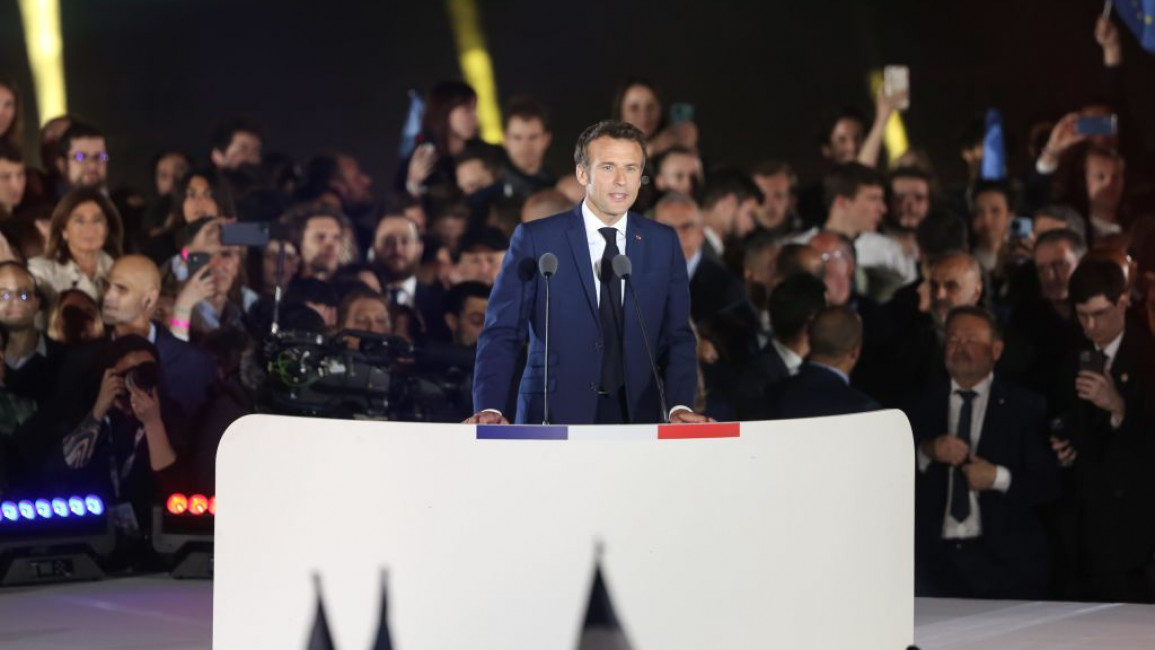
Macron's victory is paved with oppression
It is little surprise that Emmanuel Macron has been re-elected president of the French Republic. He secured 58.54% of votes, compared to Marine Le Pen’s 41.46%. Whilst he may be feeling victorious, both the voter turnout and the political ramifications of his presidential campaign should force him to seriously re-think this.
After what can only be described as an awkward parade of the winner along the Eiffel Tower, with Beethoven’s ‘ode to joy’ inappropriately playing in the background, Macron visibly hadn’t grasped how close he had been to bringing the country into the abyss just so he could stay in power. His victory speech looked and sounded just like that of 2017 when French voters were also left with the limited choice of Macron or Le Pen.
Indeed, the last president to have been so poorly elected into power was George Pompidou in 1969, which was in the aftermath of May ‘68.
Among the 48.8 million registered voters, 13.7 million chose not to participate. Another 2.2 million cast a blank ballot. Adding another million spoiled ballots into the mix, in total around 17 million people in France effectively rejected both candidates and refused to vote.
When a third of voters reject the representatives they are expected to choose, it severely undermines the legitimacy of a representative democracy.
''The levels of respectability that the National Rally has garnered was all too visible during the presidential debate between Macron and Le Pen. Not once did the sitting president critique the political views that Marine Le Pen espouses. The words ‘far right’ ‘racism’ or ‘fascism’ were never uttered by him.''
Instead of raising major alarms over where the country was heading, the National Rally - the renamed and rebranded National Front - once a marginal party, transformed into a massive political force capable of claiming the presidency twice in the last 5 years. Much of the blame should be placed at Macron’s feet.
How far they have come and the levels of respectability that the National Rally has garnered was all too visible during the presidential debate between Macron and Le Pen. Not once did the sitting president critique the political views that Marine Le Pen espouses. The words ‘far right’ ‘racism’ or ‘fascism’ were never uttered by him. In some ways this was Le Pen’s victory, despite the outcome of the second round.
It is also important to note that following five years of Macron, France’s overseas territories (the euphemism for colonies), overwhelmingly voted for Le Pen. His party’s racist rhetoric did not affect their choice. She won with 69.6% in Guadeloupe, 60.87% in Martinique, 59.10% in Muslim majority Mayotte, 51.31% in La Réunion, 60.7% in Guyana, 50.69%%in Saint Pierre Et Miquelon and 58.08% in Corsica. Only New Caledonia in the South Pacific prevented her from having a total win in the colonies with 61% for Macron.
Either Macron was so unpopular following a term of failures that this was a strange form of protest vote, or that his racist rhetoric rallied the settlers in those territories to mobilise for Le Pen while the indigenous population abstained.
As soon as Macron was declared the winner, members of his party flocked to TV stations to express that this win was the expression of popular support for his political project. Bruno Lemaire, his minister of economy, was quick to declare that this re-election was a “vote of confidence”.
However, Macron’s score is far from a plebiscite. The voters who supported him (38,52%) were down from the number he received in 2017 (43.61%). Not to mention, abstentions were the second highest since 1958 - when the Fifth Republic was formed.
Ultimately, Emmanuel Macron won the election on a field of ruins.
Much of the disillusion surrounding Macron - despite initial excitement over the ‘new, young liberal’- relates to the fact that he has spent the last few years proving there isn’t really anything fresh about his views or approach towards ruling.
A year prior to the election, the Committee for Justice & Liberties (CJL) interviewed political scientist Olivier Le Cour Grand Maison, a specialist on France’s colonial history. He warned that Macron might be young on paper but that his ideas were old, if not archaic. Indeed, Macron still believes that trickledown economics is real and that a 19th century colonial ideology is the future.
My latest for @The_NewArab
— Yasser Louati ياسر اللُّواتِي (@yasserlouati) April 14, 2022
Playing with fire over a powder keg, this is where we're at #presidentielles2022 #Presidentielles https://t.co/VdsVb2mazX
For example, deaf to the suffering of 10 million people living under the poverty line, he started his first mandate by abolishing the solidarity tax on wealth while lowering housing subsidies for lower income households. All the while, he remained oblivious to (or unwilling to acknowledge) the scourge of tax evasion and its yearly €80-100 billion cost to the economy.
While pursuing his unpopular and steady attacks on workers’ protections, he made sure that national debate remained focused on Muslims. He adopted France’s old scheme of portraying the minority group as a domestic threat and excelled in ‘islamodiversion’. Under his watch, islamophobia was being fed to millions daily.
Shockingly, he remains the only president to have given a full interview to a far-right magazine in which he of course addressed concerns with Muslims, immigration and national identity.
It is also under his watch that the minister of education setup the “Council of the elders of Laïcité” composed of historic Islamophobic figures who can officially weaponise so-called secularism against Muslims.
And, lest we forget Macron’s speech on “islamist separatism” which set the stage for his re-campaign that effectively started with the enshrining of an anti-Muslim law. This now allows the government to shut down organisations at will without due process and to kill any initiative to organise Muslims.
Racism is now part of the national conversation and will hardly be dismissed as an evil. It is now a structuring ideology of the French political landscape. So much so, in fact, that it was not even debated between the two rounds as though the wave of Black Lives Matter protests which swept across France bringing millions to the streets, didn’t even happen.
Le Pen, Zemmour and France’s once muffled neo-fascists can now come out of the closet. They could not have wished for anything better than a Macron presidency. It is thanks to him, after all, that one of their leaders became a credible presidential candidate, and another aspired to be and was given a considerable public platform.
Little faith from the population, and a lot of racism are really all that Macron has to show for his co-called victory. Unfortunately it will be the poor and the racialised that will continue to pay. Far from an ‘ode to joy’.
Yasser Louati is a French political analyst and head of the Committee for Justice & Liberties (CJL). He hosts a hit podcast called "Le Breakdown with Yasser Louati" in English and "Les Idées Libres" in French.
Follow him on Twitter: @yasserlouati
Have questions or comments? Email us at: editorial-english@alaraby.co.uk.
Opinions expressed in this article remain those of the author and do not necessarily represent those of The New Arab, its editorial board or staff.




